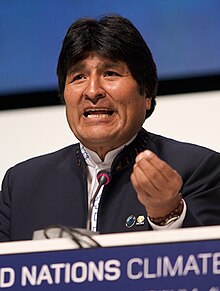反新自由主义:修订间差异
通过翻译页面“Post-neoliberalism”创建 |
(没有差异)
|
2023年7月16日 (日) 17:01的版本
反新自由主义,也被称为后新自由主义,是一种意识形态,其特点是拒绝新自由主义和华盛顿共识所体现的经济政策[1][2][3]。虽然学者们对反新自由主义的定义存在争议,但它通常包括国有化和财富再分配的经济政策、反对放松管制、金融化、自由贸易以及削弱劳工权益,以及更普遍的与左翼政治相关联[3][4]。
这一理念在拉丁美洲产生了特殊的影响,其中2000年代的"粉红浪潮"导致了拉美多国转向左翼政府[5]。过去的玻利维亚埃沃·莫拉莱斯和厄瓜多尔拉斐尔·科雷亚的政府就是反新自由主义的代表[6]。
历史

反新自由主义的理念源于1990年代和2000年代初的"粉红浪潮",在这一时期,像乌戈·查韦斯和埃沃·莫拉莱斯这样的拉美左翼反新自由主义者在这场浪潮中掌权。查韦斯于1999年当选为委内瑞拉总统,这标志着"粉红浪潮"和反新自由主义运动的正式开始[7][8]。随着他的当选,厄瓜多尔的拉斐尔·科雷亚、阿根廷的内斯托尔·基什内尔、玻利维亚的埃沃·莫拉莱斯等拉美其他与反新自由主义运动相关的领袖,在2000年代至2010年代的期间当选[3]。进入2020年代,在2021年智利大选中取得胜利的智利新总统加夫列尔·博里奇,他承诺结束智利的新自由主义经济模式,并表示:“如果说智利是新自由主义的摇篮,那她也将是新自由主义的坟墓[9]。”
虽然反新自由主义的理念并不仅限于拉丁美洲,但它主要与该地区相关联。反新自由主义的理念也引发了右翼政治派别的批评[10][11];右翼和极右翼批评人士称这词本身带有模糊和民粹主义色彩的,同时认为"反新自由主义"的政策会损害国际投资和经济发展[6]。
意识形态
反新自由主义寻求从根本上改变在华盛顿共识曾经占主导地位的那些国家的国家角色[12]。为了实现这一目标,拉丁美洲的反新自由主义领袖主张将包括天然气、矿业和石油等多个行业纳入国有化[3]。反新自由主义者也主张扩大福利待遇,增加政府在减贫方面的投资,并增加国家对经济的干预[13]。
反新自由主义政党列表
北美:
- 加拿大:魁北克团结党、魁北克绿党
- 墨西哥:国家复兴运动[16]
- 美国:绿山和平与正义党、争取社会主义和解放党
亚洲
大[需要引用]洋洲
参见
参考文献
- ^ Davies, William; Gane, Nicholas. Post-Neoliberalism? An Introduction. Theory, Culture & Society. 2021, 38 (6): 3–28. doi:10.1177/02632764211036722
 .
.
- ^ Öniş, Ziya; Şenses, Fikret. Rethinking the Emerging Post-Washington Consensus: A Critical Appraisal (PDF). ERC Working Papers in Economics 3 (9). Ankara: Middle Eastern Technical University. November 2003 [14 June 2022].
- ^ 3.0 3.1 3.2 3.3 Macdonald, Laura; Proulx, Kristina R.; Ruckert, Arne. Post-Neoliberalism in Latin America: A Conceptual Review. Third World Quarterly. 2017, 38 (7): 1583–1602. S2CID 157767263. doi:10.1080/01436597.2016.1259558.
- ^ Albo, Gregory; Altvater, Elmar; Bamford, Alec; Bayer, Kurt; Brand, Ulrich; Bond, Patrick; Brie, Michael; Chanyapate, Chanida; Ceceña, Ana Esther; Demirovic, Alex; Gago, Verónica; Melber, Henning; Selkler, Nicola; Sader, Emir; Sum, Ngai-Ling; Sztulkwark, Diego Sztulwark; Wichterich, Christa. Postneoliberalism – A Beginning Debate issue No. 51, paperback. Uppsala, Sweden: Dag Hammarskjöld Foundation. 2009 [14 June 2022]. ISBN 9789185214525.
- ^ Encarnación, Omar G. The Rise and Fall of the Latin American Left. The Nation. 9 May 2018 [14 June 2022].
- ^ 6.0 6.1 Merino, Roger. What is 'Post' in Post-Neoliberal Economic Policy? Extractive Industry Dependence and Indigenous Land Rights in Bolivia and Ecuador. Rochester, New York. 4 October 2011. SSRN 1938677
 .
.
- ^ McLean, Ian; McMillan, Allistair. The Concise Oxford Dictionary of Politics 3rd. Oxford, England: Oxford University Press. 2009 [14 June 2022]. ISBN 9780199207800 –通过Oxford Reference.
- ^ Macdonald, Laura; Ruckert, Arne. Post-Neoliberalism in the Americas: An Introduction E-book. London, England: Palgrave Macmillan. 2009. ISBN 9780230232822. doi:10.1057/9780230232822.
- ^ 引用错误:没有为名为
Cambero 20213的参考文献提供内容 - ^ Grugel, Jean; Riggirozzi, Pia. Post-neoliberalism in Latin America: Rebuilding and Reclaiming the State after Crisis (PDF). Development and Change (Blackwell Publishing/International Institute of Social Studies). 2012, 43 (1): 1–21 [14 June 2022]. doi:10.1111/j.1467-7660.2011.01746.x –通过ePrints Soton at the University of Southampton.
- ^ Macdonald, Laura; Proulx, Kristina R.; Ruckert, Arne. Post-Neoliberalism in Latin America: A Conceptual Review. Third World Quarterly (Routledge). 2017, 38 (7): 1583–1602. S2CID 157767263. doi:10.1080/01436597.2016.1259558.
The main objective of this article is to perform a critical conceptual review of post-neoliberalism to find consensus and discord in the existing literature. ... Although our search was not limited to literature on any specific region, the overwhelming amount of research we encountered was focused on Latin America, with little material identified through the search on post-neoliberalism in Africa or Asia.
- ^ Wylde, Cristopher. Latin America After Neoliberalism hardcover. London, England: Palgrave Macmillan. 2012 [14 June 2022]. ISBN 9780230301597 –通过Google Books.
- ^ Kaltwasser, Cristóbal Rovira. Toward Post-Neoliberalism in Latin America?. Latin American Research Review (Latin America Research Commons on behalf of Latin American Studies Association). 2011, 46 (2): 225–234. ISSN 1542-4278. S2CID 144279718. doi:10.1353/lar.2011.0029.
- ^ 引用错误:没有为名为
Cambero 2021的参考文献提供内容 - ^ Gabriel Boric: From student protest leader to Chile's president. BBC. 20 December 2021 [14 June 2022].
When Mr Boric won the candidacy of his leftist bloc to run for president, he made a bold pledge. 'If Chile was the cradle of neoliberalism, it will also be its grave,' he said. 'Do not be afraid of the youth changing this country.'
- ^ Declaración de principios de MORENA (PDF). Morena. December 2014 [14 June 2022]. (原始内容 (PDF)存档于14 March 2015) (西班牙语).
- ^ Zhèngcè 政策 [Policy]. Social Democratic Party. 22 January 2008 [14 June 2022]. (原始内容存档于14 May 2021).
- ^ Bagnojaui hangug, angwa bakk nolaeleul bulleossdaga 'joein'i doeneun nala, daehanmingug 박노자의 한국, 안과 밖 노래를 불렀다가 '죄인'이 되는 나라, 대한민국 [Pak Noja's South Korea, inside and outside. A country where you sing song and then become a 'sinner'. That's the Republic of Korea.]. The Hankyoreh. 26 May 2020 [14 June 2022].
민중당은 조직 노동자, 비정규직 노동자들의 지지를 받으며 좌파민족주의적 입장에서 신자유주의를 비판하는 정당이다. [Minjungdang-eun jojig nodongja, bijeong-gyujig nodongjadeul-ui jijileul bad-eumyeo jwapaminjogjuuijeog ibjang-eseo sinjayujuuileul bipanhaneun jeongdang-ida.]
- ^ http://www.columbia.edu/~lnp3/turkey.pdf, pg. 176
- ^ Australian Greens Are Building a Movement to End Neoliberalism. jacobin.com. [2023-05-13] (美国英语).
延伸阅读
- Padoan, Enrico. Anti-Neoliberal Populisms in Comparative Perspective: A Latinamericanisation of Southern Europe? 1st. London, England: Routledge. 2020 [14 June 2022]. ISBN 9780367322151.
- Mitchell, William; Fazi, Thomas. Reclaiming the State: A Progressive Vision of Sovereignty for a Post-Neoliberal World. Pluto Press. 2017. ISBN 978-0745337326.
外部链接
- Palombarini, Stefano. A Mélenchon Government Would Shake the Foundations of Neoliberalism in Europe. 访谈 with Stathis. 12 June 2022 [14 June 2022].
- Foroohar, Rana. The new rules for business in a post-neoliberal world. Financial Times. 9 October 2022.
- Levitz, Eric. The End of 'Zombie Neoliberalism'?. New York. February 1, 2023.
